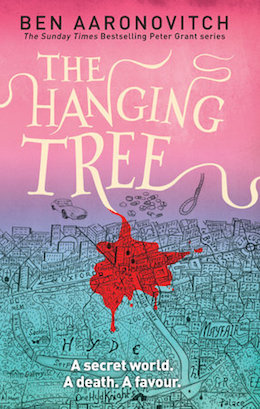I read Ben Aaronovitch’s The Hanging Tree on a very gloomy weekend. It turns out that The Hanging Tree is a book I really needed to read: it made me noticeably less gloomy.
The Hanging Tree is the sixth and latest volume in Aaronovitch’s Peter Grant series, following on from Foxglove Summer. Young Metropolitan police constable Peter Grant is one of only two police officers in London (in the entire UK) with the training to address magical crime. The other is his mentor, the exceptionally long-lived Detective Inspector Nightingale. The police force as a whole is not entirely keen on magic—or “weird bollocks,” as some of them prefer to call it—but the ones who’ve gotten most involved in Peter’s cases before are prepared to deal with it.
Fortunately for them, and for Peter, since an case that should’ve been a simple drug overdose is about to get complicated by its intersection with the inhabitants of magical London—the goddesses of London’s rivers, the peculiarly liminal demi-monde of the more-or-less human, and with Peter and Nightingale’s very own nemesis, the serial-killing Faceless Man.
The Hanging Tree begins with Peter getting a call from Lady Ty—goddess of the River Tyburn—to whom he owes a pretty large favour. Lady Ty wants her daughter Olivia kept out of trouble with the law, by any means necessary. Turns out Olivia was at a party where one of the partiers died of a drug overdose—and it turns out that the dead girl, Christina Chorley, shows post-mortem signs in her brain matter that she might have been what Peter calls a “practitioner” and what I can’t stop calling a wizard. Since it’s really difficult to learn how to use magic without being taught, Peter thinks this might be a tenuous lead that could shed some light on who the Faceless Man is and where he is now—not to mention Peter’s former friend, rogue police officer Lesley May. Of course, he still has to negotiate interviewing the great and the good and their children, which would be difficult enough if some of them weren’t gods and wizards as well as people with more money than Croesus.
What follows are hijinks, explosions, property destruction on the million-pound scale, a rival tradition of British wizardry (or rather witchery) that isn’t too happy with Nightingale’s old boys’ club tradition, and interfering American military contractors. And yes, the Faceless Man. Narrated with Aaronovitch’s trademark blend of wit, sarcasm, and police acronyms, The Hanging Tree is a breeze of a supernatural detective thriller.
It’s also a reminder that art, and representation, matters. Because as I started reading The Hanging Tree, I was watching sections of my national news—insular, Irish national news—report on the uptick of hate crimes and harassment of people of colour and LGBTQ people in the US after November 9, and compare it to the uptick of hate crimes in Britain after the Brexit referendum. The Hanging Tree is a book filled with people of colour, immigrants, and LGBTQ people, one in which it is more unusual for a named character to not share one of those characteristics than otherwise. And Aaronovitch has been doing something quietly radical in his Peter Grant novels all along. Grant is a young black police officer, the child of immigrants, and the novels are narrated from his point of view. In Aaronovitch’s narrative, not-white is the default state, and attention is most often drawn to characters’ skin colours or ethnicities where that is white or white British. In the Peter Grant novels, white is the marked state: everyone else is normal. (The Goddess of the River Thames is an immigrant. And all her daughters—including the one Peter’s sleeping with—are terrifyingly competent.)
For all my occasional problems with Aaronovitch’s work (not least the unresolved issue of Lesley May and her betrayal of Peter for a new face), this means a great deal to me. It means a great deal, too, that for most of The Hanging Tree, Peter’s partnered with an up-and-coming young police woman called Sahra Guleed, whose eye-rolling at the “weird bollocks” she has to put up with is really pretty great. (I want a novel just about her now: eye-rolling and stylish hijabs for every occasion!) And one of Peter’s senior officers, DI Stephanopoulos, is so scarily badass that rumours of her wife and their house outside London have never been confirmed.
The central mysteries of The Hanging Tree are at times a little tangled and confused, but the novel’s voice and characters more than make up for any minor defects. I truly enjoyed this book, and I really look forward to whatever comes next for Peter and his awkward relationship with the rest of the Metropolitan Police.
The Hanging Tree is available from DAW in the US and from Gollancz in the UK.
Liz Bourke is a cranky queer person who reads books. She holds a Ph.D in Classics from Trinity College, Dublin. Find her at her blog. Or her Twitter.










